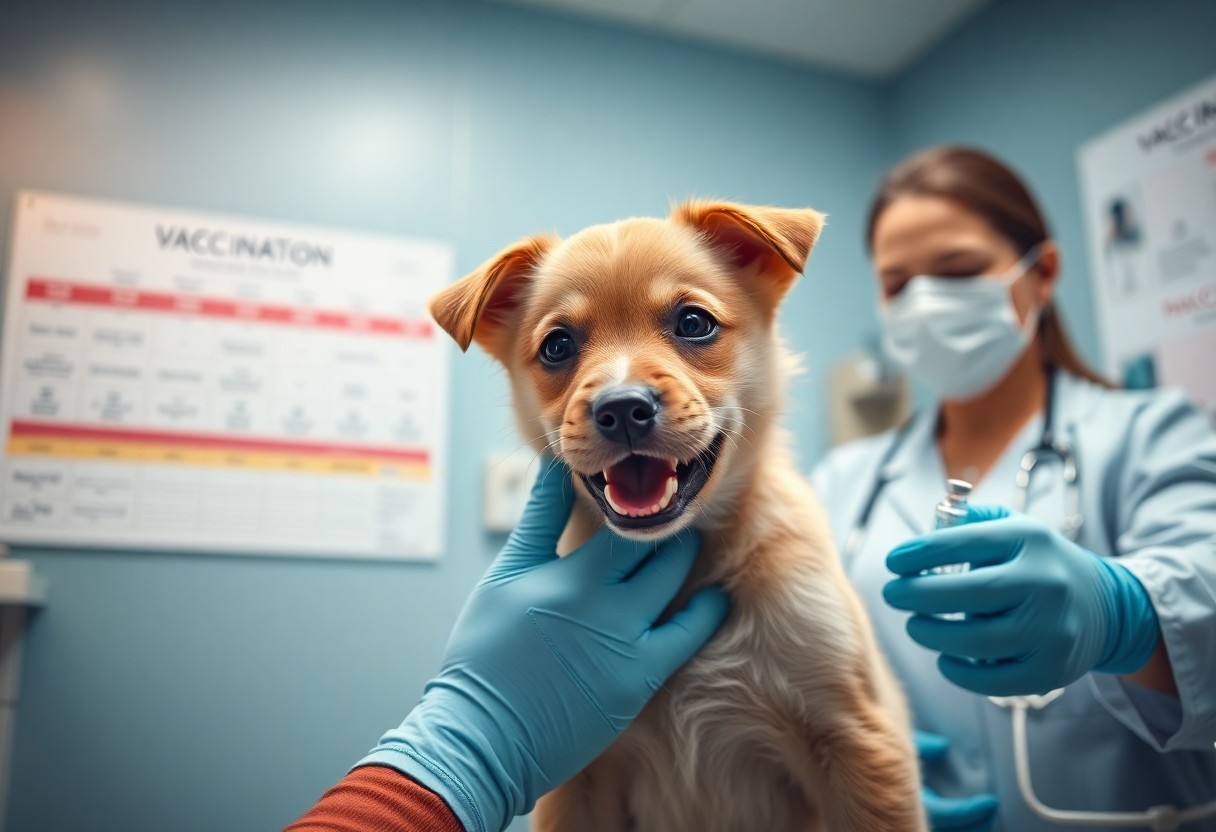Vaccines play an vital role in keeping your puppy healthy and protected from serious diseases. As a responsible pet owner, you must ensure your puppy receives the recommended vaccinations at the right time. Early vaccination helps safeguard against life-threatening conditions like parvovirus and distemper, which can devastate their health. Staying informed about vaccination schedules and the various vaccines available for your puppy is vital to provide them with a strong foundation for a healthy life. In this blog post, you will learn about the necessary vaccines and the timeline for administering them.
The First Steps: Initial Vaccinations for Newborn Puppies
Core Vaccines: Parvovirus, Distemper, and Adenovirus
Among the various vaccines available, the core vaccines are crucial for the health of your puppy. Canine Parvovirus is one of the most severe viral diseases affecting dogs, known for its ability to cause rapid dehydration and often fatal gastrointestinal distress. Distemper, another core vaccine, poses a significant threat due to its potential to affect the respiratory, gastrointestinal, and nervous systems. The Adenovirus vaccine protects against infectious canine hepatitis, which can lead to liver damage and long-term complications. Your veterinarian will emphasize the importance of these vaccinations as they create a robust defense against these life-threatening diseases.
Timing Matters: The Ideal Vaccination Schedule
Establishing a vaccination schedule begins as early as six to eight weeks of age, and your puppy will require a series of vaccinations to ensure optimal protection. Typically, the first round of vaccinations includes the core trio of Parvovirus, Distemper, and Adenovirus, followed by boosters every three to four weeks until your puppy reaches about sixteen weeks of age. Completing this schedule on time is vital; any gaps in vaccinations can leave your puppy vulnerable to contracting these diseases.
In a well-structured timeline, after the initial vaccinations, your puppy may receive additional vaccines, including those for Rabies and Bordetella. These extra vaccinations often come in around twelve to sixteen weeks of age and may be required depending on local ordinances and your dog’s lifestyle. Always consult your veterinarian to establish a tailored vaccination plan based on your puppy’s specific needs and risks, ensuring your new furry family member is thoroughly protected.
Beyond the Basics: Optional Vaccines and Their Importance
While core vaccines establish a solid foundation for your puppy’s health, optional vaccines can provide additional protection against certain diseases that may be more prevalent in your area or related to your puppy’s lifestyle. Discussing these vaccines with your veterinarian is imperative, as they may recommend certain shots based on your geographical location and the specific risks that come with environments like dog parks, kennels, or rural areas. For instance, Bordetella bronchiseptica, responsible for kennel cough, is often recommended for dogs that frequently socialize with other pets. This highly contagious infection could sideline your puppy for weeks, so considering this vaccine may be beneficial if you plan to enroll your pet in training classes or boarding facilities.
Another optional vaccine to ponder is for Leptospirosis, a bacterial infection that affects both dogs and humans and can be contracted through contaminated water or soil. This vaccine is particularly advised if your puppy may come into contact with wildlife or roam in areas where the bacteria are prevalent. Although the risks vary by region, if you live in an area with a history of lepto outbreaks, this vaccine could be a lifesaver, preventing possible liver or kidney damage that can arise from the disease.
Bordetella and Leptospirosis: Are They for Every Puppy?
The Bordetella vaccine is not universally required, but its necessity becomes clear once you assess your puppy’s lifestyle. If your puppy is primarily a homebody, the risks may be lower, but the moment you introduce them into social situations, such as dog parks or daycare environments, the benefits of this vaccine become apparent. Kennel cough spreads quickly in group situations, and a simple vaccine can mitigate the chances of a costly veterinary visit due to an infection that could leave your puppy coughing for weeks. In contrast, the Leptospirosis vaccine, often overlooked, provides another layer of defense, especially in warmer, wet climates where wildlife feces can contaminate water sources.
For both vaccines, discussing their merits with your vet ensures you make informed decisions tailored to your puppy’s needs. They will consider factors such as age, health status, and lifestyle before advising on these optional vaccines.
Rabies: Legal Requirements and Timing
The rabies vaccine is non-negotiable not only for the well-being of your puppy but also due to legal requirements in many areas. Generally, the first rabies vaccination is administered between 12 to 16 weeks of age, followed by a booster one year later. After that, many regions expect a booster every three years, although local regulations can differ. If you travel with your dog or plan to relocate, it is imperative to possess documentation proving your puppy has been vaccinated against rabies, as this is often required for international travel and can prevent quarantine.
Ensuring your puppy gets the rabies vaccine within the recommended time frame protects them from this potentially fatal disease, enabling them to lead a safe, social life. Furthermore, rabies vaccination is not just about safeguarding your pet; it also helps protect community health. In many states, laws dictate that all dogs must be vaccinated against rabies, and your veterinarian will help ensure your compliance with these legal obligations.
Understanding Booster Shots: Keeping Immunity Strong
The Science Behind Boosters
Booster shots serve to reinforce your puppy’s immune response after the initial vaccination. Initially, vaccines introduce a weakened or inactive form of a virus or bacteria to your puppy’s immune system, prompting it to produce antibodies. However, over time, protection can wane as the immune system may no longer recognize the pathogens effectively. Booster shots act as a reminder, stimulating the immune system to ramp up antibody production, ensuring your puppy maintains a robust defense against diseases like parvovirus and canine distemper.
Research indicates that certain vaccines show a decline in immunity within one to three years post-injection, depending on the disease. For example, the Distemper virus can lose its effectiveness significantly if not boosted. By adhering to a scheduled regimen of booster shots, you actively contribute to your puppy’s long-term health, preventing potentially serious and often life-threatening conditions.
Recommended Booster Schedule
The typical booster schedule for puppies begins around the ages of 10 to 12 weeks and continues until they reach around 16 to 18 weeks of age. Initial vaccines usually include a combination of core vaccines, such as DHPP (Distemper, Hepatitis, Parvovirus, and Parainfluenza). Following this initial series, your veterinarian will recommend boosters to maintain immunity—many core vaccines only require a booster once every one to three years once your puppy reaches adulthood.
For instance, Bordetella (Kennel Cough) may require an annual booster, while other vaccines like Rabies often depend on local regulations but generally have a longer-lasting effect. Sometimes, your veterinarian may suggest a blood titer test to check your puppy’s immunity levels, allowing for more tailored vaccine recommendations. This proactive approach helps ensure your puppy not only stays protected but also receives only the necessary vaccinations for their unique lifestyle.
Factors Influencing Vaccine Choices: Lifestyle and Environment
Your puppy’s vaccination plan should be tailored not only to breed but also to lifestyle and environmental factors. For instance, if you live in a densely populated urban area, your puppy might face a higher risk of exposure to virus carriers such as wildlife or other dogs in parks. Conversely, if you reside in a rural setting, the risks could differ substantially based on the local animal population and community practices regarding pet care. When considering vaccinations, take into account your puppy’s socialization opportunities and expected environments, such as whether it will frequently visit dog parks, daycare, or compete in events.
- Urban or rural living conditions
- Frequency of outdoor activities
- Socialization with other pets
- Exposure to wildlife or local disease outbreaks
This nuanced approach helps prevent not just common diseases but also those that are prevalent in specific areas at any given time, ensuring your puppy remains healthy throughout its life.
Breed-Specific Considerations
Different breeds come with varying health profiles and susceptibility to specific diseases. For example, certain small breeds may be more susceptible to parvovirus, while large breed puppies might need particular attention to bloat and related conditions. Understanding these tendencies can shape your decision-making regarding which vaccines are imperative for your puppy. Consulting with your veterinarian about breed-specific recommendations ensures you provide the appropriate protection for your puppy’s unique needs.
Working breeds, such as Border Collies or German Shepherds, might benefit from a more robust vaccination strategy, particularly if they are intended for activities with high exposure to other animals. As a proactive pet owner, knowing how your puppy’s breed impacts its health risks will empower you to manage and prioritize its vaccination schedule effectively.
Exposure Risks Based on Environment
The environment your puppy inhabits significantly dictates its exposure level to various diseases. Puppies in urban areas frequently interact with other dogs and are typically at a higher risk of acquiring illnesses such as canine influenza or kennel cough. If you live near dog parks or pet grooming salons, the risk of infection increases, thereby underscoring the need for comprehensive vaccinations. Additionally, if your puppy is frequently exposed to wildlife, such as raccoons or feral cats, vaccines against rabies or leptospirosis could be imperative for preventing infections that are transmitted through contact with wildlife urine or bites.
When assessing environmental factors, consider areas where your puppy will spend the most time, such as local parks or dog-friendly venues, and your community’s overall health as it pertains to canine diseases. Factors such as reported outbreaks of parvovirus, leptospirosis, or other communicable diseases in your locality should also inform your vaccination strategy. This awareness helps you craft the most effective vaccination plan for your puppy, minimizing the risk of exposure to harmful diseases.
Common Misconceptions: Debunking Vaccine Myths
Vaccination vs. Natural Immunity: What You Need to Know
Some pet owners believe that allowing their puppies to develop natural immunity through exposure to diseases is a safer option compared to vaccinations. This misconception overlooks critical information about disease prevalence and severity. For instance, diseases such as parvovirus and distemper can cause severe health complications or even death in young, unvaccinated puppies. Vaccination introduces a controlled amount of the virus, enabling your puppy’s immune system to learn to fight it without ever becoming ill from the disease itself.
Natural immunity does play a role; however, relying solely on it places your puppy at unnecessary risk. Puppies are especially vulnerable until their immune systems fully mature, which is typically around six months of age. During this period, high exposure to pathogens can lead to serious long-term health consequences, far outweighing the benefits of seeking “natural immunity.” Taking proactive steps through vaccination is a more reliable method to ensure your puppy avoids harmful diseases.
The Truth About Vaccine Reactions
Vaccine reactions are another common concern among puppy owners. While some dogs may experience mild side effects like fatigue, soreness at the injection site, or a low-grade fever, serious reactions are extremely rare. The general incidence of serious adverse reactions is less than 1 in 100,000 vaccinations administered. In fact, the benefits of vaccination far surpass the risks involved. Not only do vaccines significantly decrease the likelihood of debilitating diseases, but they also safeguard public health by reducing disease transmission.
Your responsibility as a pet owner is to educate yourself about what to expect post-vaccination. Those mild reactions mentioned earlier typically resolve within a day or two and are a sign that your puppy’s immune system is functioning as expected. If any severe reactions, telles like extreme swelling, persistent vomiting, or collapse occur, they should be treated as emergencies and require immediate veterinary attention.
Summing up
On the whole, ensuring your puppy receives the appropriate vaccines at the right times is necessary for their health and well-being. Typically, your puppy will need a series of vaccinations starting at approximately six to eight weeks of age, followed by booster shots every three to four weeks until they are about four months old. Key vaccines include those for canine parvovirus, distemper, and kennel cough, among others. Staying in touch with your veterinarian will help you tailor a vaccination schedule that fits the specific needs of your puppy, based on their breed, lifestyle, and any regional health concerns.
As your puppy grows, keeping up with vaccinations becomes just as important as the initial shots. Adult dogs will also require regular booster shots to maintain their immunity. Moreover, don’t overlook the importance of vaccines like rabies, which may be legally required in your area. By actively participating in your puppy’s vaccination schedule, you can help protect them from potentially life-threatening diseases and ensure they live a long, healthy life by your side.







